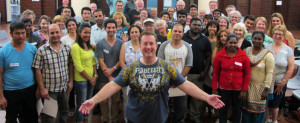A day in the life of Melbourne’s multicultural hub

The Voices Without Borders Choir
Melbourne’s diverse and ever changing cultural landscape has a meeting point in the form of a three-story building. It’s called the Multicultural Hub and it’s arguably one of the city’s best kept secrets.
The Hub, owned by the City of Melbourne, was set up by AMES in 2008 when they recognised a lack of facilities to support the city’s range of expansive cultures.
The diverse space, located across from Victoria Markets, has various low-cost rooms for hire that support everything from Bollywood dance classes to Red Cross employee training.
As well as offering rooms for hire for external use, there are also a number of free workshops run by AMES that cater to the needs of newly arrived immigrants and refugees.
Maria Tsopanis, Senior Manager of Community Participation at AMES, views these programs as a way to engage communities in a positive way, outside of the normal funded areas of AMES.
“Our programs focus on skill development for the individual and capacity building for the communities,” said Maria.
“The Hub gives us an opportunity to run programs that promote social well-being and employment education as well as activities such as drama and music as a way of engaging people.”
The huge range of events is what makes users keep coming back for new experiences and to learn more skills.
“Participants come here for education, socialising and to gain an understanding of not only Australian culture but other cultures too.”
There is no better way to experience Melbourne’s unique cultural diversity than by spending a day at the Hub.
On a Monday in April this year users of the hub included: a Bollywood dancing session; lessons in creative journaling; tax advice for newcomers to Australia; English Conversation sessions; Russian Language classes; and, a movie screening.
Training or meetings were being held by organisations including: Life Without Barriers; Crisis Intervention & Management Australia; the Australian Federation of Disability Organisations; The Job Training Institute; and, Project Hope Horse Welfare.
The Voices Without Borders Choir and Maracatu Estrela do Mar are just two of the Hub users that have developed fame nationally through their skills and commitment to social inclusion.
Maracatu Estrela do Mar, an Afro-Brazilian percussion group, has been practicing in the Hub’s rehearsal room for three years.
Antonio Moreira, head of Maracatu Estrela do Mar, hopes that through art he can promote inclusion, break cultural barriers and share part of his own culture.
“My goal was to create and maintain a fun and culturally rich activity which creates soc
ial inclusion, facilitates social engagement and also promotes teamwork and brain development,” said Antonio.
“Through doing this, Maracatu Estrela do Mar will help local communities to engage and break through cultural differences, creating an inclusive and cohesive community.”
Antonio also regularly attends Hub events such as writing workshops, Capoeira classes and events held by Multicultural Arts Victoria.
“I am really proud to know that I am a user and a provider at the Hub. It’s good to know that City of Melbourne and AMES has managed to sustain such a place, with a good location, awesome staff team and environment.”
To book a room at the Hub go online, or to attend an event then simply pop into 506 Elizabeth St.
Ruby Brown
AMES Staff Writer












